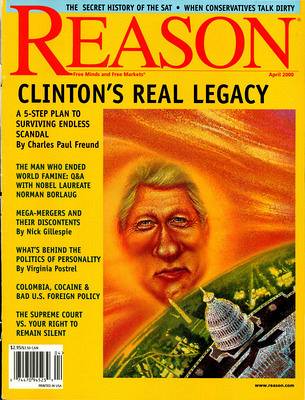What Bill Clinton Can Teach Donald Trump About Surviving Endless Scandal
The former president radically flipped the conventional wisdom about dealing with political enemies, legal issues, and impeachment.


Donald Trump is going to need a bigger barrel.
If the BuzzFeed story about him telling former attorney Michael Cohen to lie to Congress and federal investigators holds up (a very big if, given past too-good-to-check stories), the president is definitely in deeper dog-doo than before. But if anyone has shown an ability to get out jams that would have crushed other politicians, it's Donald Trump.
Meanwhile, Trump's one-time pal, Bill Clinton, not only survived being the second president to be impeached but came out smelling like a rose. Bubba's popularity soared while his dark twin, Speaker of the House Newt Gingrich, was effectively destroyed by the impeachment he engineered.
With that in mind, Trump—and reporters who either weren't around in the '90s or have shitty memories—would do well to peruse this Reason story from April 2000: "Secrets of the Clinton Spectacle: A five-step program for surviving endless scandal."
How, Charles Paul Freund asked, did Bill Clinton manage to rise above "bimbo eruptions" on the campaign trail, "Travelgate," the failure of "ClintonCare," a clean sweep of Congress by Republicans in 1994, the drip-drip revelations of his affair with intern Monica Lewinsky, and more?
A common explanation from many frustrated conservative critics is that Clinton has been let off the hook by a "liberal" Washington press corps. But while one can argue with many aspects of the mainstream media coverage of the Clinton presidency, a demon "liberal press" has hardly let him off easy. Most of the credible damaging information about the Clinton years was developed by mainstream reporters. The reporter whom the Clintons are reputed to "fear" most is Jeff Gerth of The New York Times. The story that did the most damage to the administration—the Lewinsky matter—was developed by Michael Isikoff of Newsweek. The paper that actually broke that scandal, and that put the Broaddrick story on its front page, was The Washington Post. Even the most definitive account of the apparently unjustified (but self-serving) bombing of the Sudanese pharmaceuticals factory appeared in, of all places, The New Yorker, otherwise noted for its bona fide pro-Clinton slant. TV reporters likewise broke many stories damaging to Clinton, and the all-news cable services have been happy to devote their 24–7 schedules to his juicier problems….
The answer is deceptively simple: Clinton ignored traditional Washington wisdom for dealing with exploding scandal and instead used the capital's notorious scandal machine against itself. Scandal is unlikely ever to be the same. Bill Clinton's long-sought Legacy turns out to be a guide on how to rise from the dead.
Freund identifies five big strategies, many of which Donald Trump is already employing.
- A SCANDAL IS JUST A STORY
- YOU DON'T FEED A BAD STORY
- STORIES ARE ABOUT PEOPLE
- WAR IS THE BIGGEST STORY
- THE PRESIDENCY IS A COUNTER-STORY
That last point is worth underscoring, as it's clear that Trump is following the example set by Clinton. Far more than George W. Bush or Barack Obama, the Donald is dominating the news cycle, typically via Twitter, even (or maybe especially) when the media is leading with bad stuff about him.
Presidents command so much attention that they can make news anytime they want. A scandal-savvy president can employ this power to affect the context in which negative stories are taking shape. He can create counter-stories virtually at will, including major stories that can drive negative scandal coverage below the front-page fold, at least temporarily. He can also use the news-making power of his office to reposition himself advantageously in relation to threatening scandal stories.
Bill Clinton has chosen to make news of some sort almost every day. If he is not announcing initiatives on children's car seats or teenage smoking or some similar subject that other presidents have left to their under-assistant undersecretaries, then he is announcing the sudden deployment of the military. The little daily feel-good initiatives have served him well during his ceaseless hours of scandal, since they have provided him at least some positive coverage even on many of his worst days. As we have seen, the occasional and timely assumption of the mighty role of commander-in-chief has been his ace in the hole.
The most-disturbing point in Freund's piece is that Clinton wasn't shy about using the military to change the national conversation:
Twice in 1998, Bill Clinton deployed the military force of the United States at moments when the scandal stories threatening him were reaching their most dangerous stages. The evening before Monica Lewinsky was to appear before the grand jury, Clinton struck at targets in Sudan and Afghanistan in purported revenge for the bombing of American embassies earlier that summer. In December, on the evening before the House vote on impeachment, Clinton suddenly launched an attack on Iraq, claiming the necessity of acting in advance of a fast-approaching Ramadan.
Read the whole thing. And maybe start thinking about refiling that Canadian citizenship paperwork.


Show Comments (74)